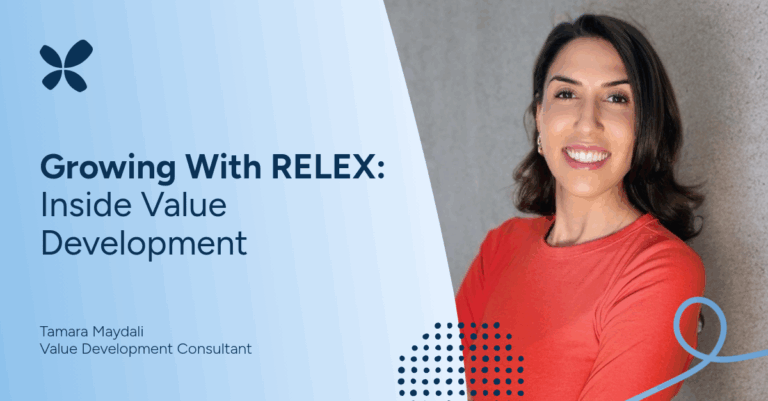Manufacturing Optimization: Inside RELEX’s Approach
Sep 2, 2025 • 8 min
When Paula Costa, Talent Acquisition Lead at RELEX, sat down with Ville Auramo, Engineering Manager, for a conversation about RELEX and the future of manufacturing optimization, her questions revealed the technical depth and culture that drives innovation behind the scenes. Through Paula’s exploration of everything from runtime performance challenges to company values, one thing became clear: solving complex supply chain problems requires both advanced technology and a workplace that supports continuous learning.
A Decade of Growth at One Company
Ville’s journey at RELEX tells the story of someone who found the right fit early. Having joined over 10 years ago while still completing his studies, RELEX has been his only “proper job.” “There definitely is something in the water that keeps me motivated to continue my journey here,” he reflects.
What started as a young professional’s first role has developed into a career spanning different R&D positions. “During my time at RELEX, I have had the privilege to work in different R&D roles with a broad range of amazing colleagues. Each role has had its own unique, interesting subject matter topics and different technical challenges,” he explains.
Each role has had its own unique, interesting subject matter topics and different technical challenges.
Initially, Ville admits he took many aspects of RELEX’s culture and work environment for granted. “It was only later on, when I truly started to recognize the more unique aspects that make working at RELEX nice.”
The Technical Mission: Optimal Demand Fulfillment
When Paula asked about RELEX’s approach to manufacturing optimization and its role in the company’s mission to “Plan better, sell more, waste less,” Ville’s response revealed the technical complexity behind straightforward goals.
“Ultimately, everything we do stems from the goal of fulfilling customer demand in the most optimal way,” Ville explains. “Our planning platform enables a lot of different bells and whistles to help automate planning processes that all aim to achieve this seemingly simple goal.”
The technical scope is substantial. RELEX’s software automates the calculation of production and purchase order proposals based on demand, production capacities, constraints, and penalty rules. It ensures optimal quantities for each product structure at each manufacturing site, considering make/buy decisions and supplier options and quotas.
The platform also optimizes the precise quantities needed for each distribution link and product in every period, considering demand, network structure, capacities, sourcing rules, constraints, and demand/supply penalties.
“Our planning platform enables a lot of different bells and whistles to help automate planning processes that all aim to achieve this seemingly simple goal.”
The objective is straightforward: ensuring goods are manufactured and delivered to the correct place at the correct time, minimizing waste while fulfilling manufacturer demand. This practical approach to complex logistics appeals to Ville, who finds streamlining the journey of physical goods from raw material purchasing to store delivery technically interesting.
Full-Stack Technology and Architecture
The technical infrastructure spans the full stack with specific technology choices. “Kotlin and Java power our backend services, Python is used for data and optimization logic and React with TypeScript drives our frontend,” Ville details. “We design and run custom heuristics and optimization models at scale, deployed via Kubernetes with CI/CD pipelines and infrastructure-as-code.”
Whether building algorithms, UIs, or scalable systems, the goal remains turning complex manufacturing challenges into automated, efficient decisions.
Current Manufacturing Challenges
Paula’s inquiry into the biggest challenges facing manufacturers revealed three key areas where RELEX provides technical solutions.
RELEX’s platform includes built-in scenario planning, allowing manufacturers to evaluate and choose the best strategies to navigate these uncertainties effectively.
First, retailers demand high service levels and often very short lead times, requiring manufacturers to maintain high reactivity in their supply chain planning. “RELEX addresses this with its highly reactive platform, enabling real-time adjustments to meet these demands,” Ville explains.
Second, the rise of private label products puts pressure on manufacturers’ margins, making cost optimization critical. “RELEX helps minimize costs like overtime, expiry, expediting, and inventory through advanced supply chain optimization tools.”
Finally, supply chains have become increasingly fragile due to disruptions like shipping route changes, tariffs, and climate impacts. “RELEX’s platform includes built-in scenario planning, allowing manufacturers to evaluate and choose the best strategies to navigate these uncertainties effectively.”
The Core Technical Challenge: Performance vs Complexity
When Paula probed into the most technical challenges RELEX tackles in manufacturing, Ville highlighted a fundamental engineering problem: “One of the key technical challenges for us is the balance between runtime performance and calculation complexity.”
As he explains, “The real world indeed imposes a lot of different complexities and constraints, which create challenges for building an automated planning platform.”
One of the key technical challenges for us is the balance between runtime performance and calculation complexity.
The solution requires focusing on the biggest bottlenecks and deciding which real world complexities can be ignored to focus on the main operational challenges. “This can be achieved e.g. with prioritizing the most granular and complex calculations for the operationally most critical time horizon. The longer-term horizon calculations can then be done with more relaxed constraints, simpler and more performant solving approaches or calculating plans on higher aggregate levels.”
The real technical challenge emerges in integration: “When this is done, there are many technical challenges on balancing how these different calculation methods are integrated smoothly together.”
Platform Architecture and Scalability
Paula’s follow-up question about how RELEX’s technology stack enables innovation revealed the platform’s core strengths. “The RELEX planning platform is a highly scalable piece of software, which enables us to handle a lot of data efficiently and execute complex and data-rich calculations in a very performant way,” Ville explains.
The platform’s modularity is key: “Furthermore, the platform offers a very modular no-code layer on top, with which, together with our extensive Best Practices, our solutions can be tailored for individual customer needs.”
Engineering Culture: Support and Informality
When Paula shifted the conversation to explore what it’s like to work at RELEX, Ville’s reflections revealed how the company’s culture enables technical work.
“One of the major things I have really appreciated is the possibility for experts to face new exciting challenges. This has been one major motivator for me. Getting to work on cool problems with a group of motivated people is a great experience,” he shares.
The support system is crucial: “While on a personal level it has sometimes felt like jumping off the deep end, everybody supports each other and work together towards a common goal. During this, we keep things informal, and have a lot of fun at the same time.”
One of the major things I have really appreciated is the possibility for experts to face new exciting challenges.
Despite company growth bringing organizational structure, Ville notes that “most things culturally have stayed the same. This is something that I have learnt to respect even more in my current role, and I try to ensure that I can also carry the torch together with our team.”
Values in Practice
Paula’s exploration of how RELEX’s core values – “The colleague is a friend” and “Life is supposed to be fun” – shape daily work revealed their practical impact.
“What I most appreciate is the cultural freedom for experts to learn and strive. I guess this is one aspect of the ‘colleague is a friend’ value,” Ville explains. “No matter what your job title is, if you have eagerness to solve a problem, e.g. some new idea that could help, you are given the possibility to contribute to building a better solution for our customers.”
The work environment maintains balance: “While we work with important topics, sometimes with time pressure, the best work achieved when the work atmosphere is kept casual and fun. We take our work seriously, but we don’t need to take ourselves so seriously all the time!”
Technical Talent and Team Structure
Paula’s questions about talent and team dynamics revealed the breadth of technical roles within RELEX’s manufacturing-focused teams. “The manufacturing-focused world is still quite broad, so people with many different backgrounds can fit nicely,” Ville explains. “We have frontend specialists, business logic and algorithm developers, data science and machine learning experts, slightly more business-oriented solution architects and so on.”
Communication skills matter, but not in the traditional sense. “Communication skills is one obvious one, and I don’t mean fancy PowerPoint and presentation skills,” Ville clarifies. “Within the manufacturing-focused R&D department, we almost 100 experts working towards the same broader goal. This requires that people plan and work together with highly skilled and motivated people.”
A huge bonus is the fact that, if we do our job well, it usually means also reduction of waste (spoilage, transportation etc.), which has a big positive impact on the world.
Technical motivation is essential: “I think one important aspect is indeed the quality of finding the technical challenge motivating and interesting. In essence, we work on streamlining the journey of physical goods, from raw material purchasing all the way to a store delivery. This has a very practical element to it, which I find very intriguing.”
There’s also the broader impact: “Personally at least, a huge bonus is the fact that, if we do our job well, it usually means also reduction of waste (spoilage, transportation etc.), which has a big positive impact on the world.”
What Sets RELEX Apart
As Paula’s conversation drew toward what makes RELEX special as an employer, Ville emphasized the combination of technical challenges and work environment. “The combination of a fun and relaxed atmosphere and interesting technical challenges is something that I think is special. We get to work with amazing people and cutting-edge technologies to figure out clever solutions for important manufacturing-related problems.”
But it’s the ambition that truly distinguishes RELEX: “What truly sets RELEX apart is our ambition – we’re not just here to do good work; we’re here to be the best at what we do and to redefine the industry. This shared drive to conquer the world in a humble manner, paired with a culture that values fun and collaboration, makes RELEX an exceptional place to grow and thrive.”
An Engineer’s Recommendation
Through Paula’s questions, Ville’s decade-long journey from student to Engineering Manager demonstrated the technical growth opportunities available at RELEX and how the company supports engineers tackling complex manufacturing optimization problems.
His advice for those considering RELEX is direct: “I want to encourage anyone who finds the above intriguing to just apply and come see for yourself! Trust me, you won’t be disappointed.”
For engineers and developers interested in working on custom heuristics and optimization models, building highly scalable systems that handle complex data-rich calculations, or solving real-world manufacturing problems with Kubernetes, CI/CD pipelines, and infrastructure-as-code, RELEX offers both the technical challenges and supportive culture that enable meaningful work.
The manufacturing revolution needs technical talent ready to work with Kotlin, Java, Python, React, and TypeScript while tackling runtime performance and calculation complexity challenges. If you’re interested in building automated planning platforms that reduce waste and optimize supply chains, RELEX’s manufacturing-focused teams are looking for you.
Interested in joining the team? Explore our careers section and dive into the RELEX experience!



